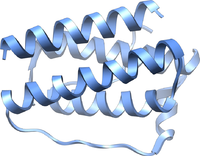
Photo from wikipedia
Leptin signaling blockade by chronic overstimulation of the leptin receptor or hypothalamic pro-inflammatory responses due to elevated levels of saturated fatty acid can induce leptin resistance by activating negative feedback… Click to show full abstract
Leptin signaling blockade by chronic overstimulation of the leptin receptor or hypothalamic pro-inflammatory responses due to elevated levels of saturated fatty acid can induce leptin resistance by activating negative feedback pathways. Although, long form leptin receptor (Ob-Rb) initiates leptin signaling through more than seven different signal transduction pathways, excessive suppressor of cytokine signaling-3 (SOCS-3) activity is a potential mechanism for the leptin resistance that characterizes human obesity. Because the leptin-responsive metabolic pathways broadly integrate with other neurons to control energy balance, the methods used to counteract the leptin resistance has extremely limited effect. In this chapter, besides the impairment of central and peripheral leptin signaling pathways, limited access of leptin to central nervous system (CNS) through blood-brain barrier, mismatch between high leptin and the amount of leptin receptor expression, contradictory effects of cellular and circulating molecules on leptin signaling, the connection between leptin signaling and endoplasmic reticulum (ER) stress and self-regulation of leptin signaling has been discussed in terms of leptin resistance.
Journal Title: Advances in experimental medicine and biology
Year Published: 2017
Link to full text (if available)
Share on Social Media: Sign Up to like & get
recommendations!